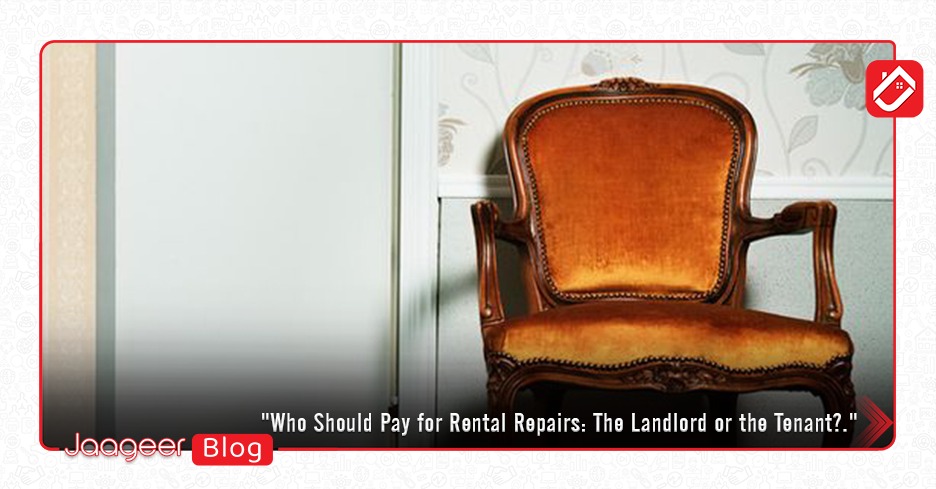Who Should Pay for Rental Repairs: The Landlord or the Tenant?
Renters and landlords have frequently disagreed about who should foot the bill for property damage. The tenants contend that the landlords should be both financially and physically liable for such matters, notwithstanding the homeowners' assertion that any necessary repairs or upkeep must be paid for by those who live in the property.
Without a doubt, if the landlord and the renter can't come to terms with a few fundamental guidelines, the dispute could easily spiral out of control. It is crucial to realize that the nature of the issue might play a role in determining who is in charge of fixing it. Let's examine what repairs tenants are liable for in more detail.
WHEN ARE LANDLORDS LIABLE FOR REPAIRS?
According to most state and federal laws, landlords are responsible for maintaining the rental property and ensuring that it is safe and habitable for tenants. This includes making repairs to the property, such as fixing a leaky roof, broken appliances, and any issues related to the structure, sanitation, heating, and electrical systems.
Landlords are responsible for making emergency repairs immediately, such as fixing a broken water pipe or a leaking roof. Landlords are also responsible for regular maintenance and upkeep of the property, such as painting, cleaning gutters, and maintaining the lawn. Landlords are responsible for addressing any health and safety hazards on the property, such as fixing a broken stair or addressing a pest infestation. Landlords are also responsible for ensuring that the property complies with state and local housing codes, such as having working smoke detectors and proper ventilation. Landlords should communicate with their tenants about the repairs that need to be done and the estimated time for completion. They should also coordinate with the tenants for access to the property for repairs.
It's important to note that laws and regulations may vary depending on the jurisdiction, it's recommended to review the local laws and consult with a lawyer if you have any doubts.
TENANTS RESPONSIBLE FOR RENTAL REPAIRS
.jpeg)
Tenants are typically responsible for taking care of the rental property and for any damages that they or their guests cause to the rental property. Here are some examples of tenant responsibilities related to repairs:
Tenants are responsible for any damages they or their guests cause to the property, such as holes in the walls, broken windows, or stains on the carpet caused by neglect or misuse. Tenants are also responsible for keeping the rental property clean and well-maintained, such as cleaning the kitchen and bathrooms and keeping the yard tidy. Tenants may be responsible for making minor repairs, such as replacing light bulbs or smoke detector batteries. Tenants are also responsible for ensuring that their actions do not violate state and local housing codes, such as not overcrowding the rental property or not allowing illegal activities on the property. Tenants should report any needed repairs or damages to the landlord promptly, giving him the chance to fix them.
It's important to note that laws and regulations may vary depending on the jurisdiction, it's recommended to review the local laws and consult with a lawyer if you have any doubts. And usually, the rental agreement should specify who is responsible for repairs and maintenance, and in the event of a dispute, it will be the basis of the
DAMAGE CAUSED BY NORMAL WEAR AND TEAR
Damage caused by normal wear and tear is generally considered to be the responsibility of the landlord to repair or replace. Normal wear and tear refer to the gradual deterioration of a rental property that occurs due to the natural use of the property over time.
Examples of normal wear and tear include:
Scuffs on the walls caused by moving furniture Worn-out carpet or faded paint Loose door handles or doorknobs Minor leaks in the plumbingIt's important to note that normal wear and tear is different from damages caused by neglect or misuse by tenants. For example, a stain on a carpet caused by a spilt drink is considered damage and the tenant may be responsible for cleaning or replacing it.
It's also important to note that laws and regulations may vary depending on the jurisdiction, it's recommended to review the local laws and consult with a lawyer if you have any doubts. And usually, the rental agreement should specify who is responsible for repairs and maintenance, and in the event of a dispute, it will be the basis of the decision.
DAMAGE CAUSED BY NATURAL DISASTERS
.jpeg)
Damage caused by natural disasters, such as floods, hurricanes, tornadoes, earthquakes, and fires, is generally considered to be the responsibility of the landlord to repair or replace unless the tenant has insurance. In most cases, landlords are responsible for insuring the building and its contents and for making any necessary repairs or replacements. Tenants are typically required to have renters insurance, which can help cover the cost of personal property damaged by natural disasters. Landlord insurance typically covers the building and its contents, including any damage caused by natural disasters. In case of a natural disaster, tenants should contact the landlord as soon as possible to report any damage and to coordinate the repair process. In case of a natural disaster, tenants should follow the instructions of the local authorities and emergency services, especially in the case of evacuation orders.
RENTAL AGREEMENT
A rental agreement, also known as a lease agreement, is a legally binding contract between a landlord and a tenant that outlines the terms and conditions of the tenancy. The agreement typically includes information such as the length of the tenancy, the rent amount and due date, the security deposit, and the responsibilities of both the landlord and the tenant.
Rent and security deposit: The rental agreement will specify the amount of rent due and when it is due, as well as any late fees that may apply. It will also specify the amount of the security deposit and the conditions under which it will be returned to the tenant at the end of the tenancy.
Maintenance and repairs: The rental agreement will specify who is responsible for maintenance and repairs and the procedures for reporting needed repairs.
Use of property: The rental agreement will specify the terms of use of the property, such as whether pets are allowed, whether smoking is allowed, and whether the tenant is allowed to sublet the property.
Termination and eviction: The rental agreement will specify the conditions under which the tenancy may be terminated and the procedures for eviction.
State and local laws: The rental agreement must comply with all state and local laws, including those related to fair housing, security deposits, and eviction procedures.
It's important to review the rental agreement carefully before signing it and to consult a lawyer if you have any questions or doubts. The rental agreement is a legally binding contract and tenants are responsible for adhering to the terms outlined in it.
Head over to Jaageer Blog to read more of our informative pieces covering different aspects. You can also connect with us on our Facebook and Twitter accounts.
Jaageer.com








